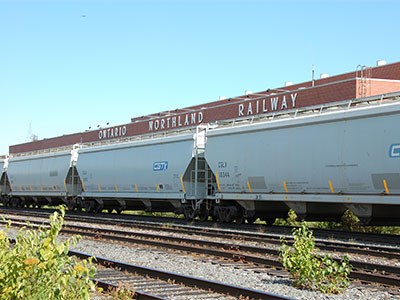A new “transformational” era has arrived at a reformed Ontario Northland Transportation Commission (ONTC) and its interim CEO is urging everyone to get on board.
Senior management at the North Bay-headquartered Crown agency are hitting the road for a series of town hall discussions in communities across northeastern Ontario to lay out their plans to transition into a new chapter.
“I’m hoping it’s sort of a Northern Ontario family initiative,” said chief operating officer Corina Moore, who’s temporarily occupying the seat while a search is underway for a permanent chief executive.
Paul Goulet resigned as president and CEO in October after more than four years at the helm.
The ONTC’s telecommunications arm, Ontera, was sold to Bell Aliant during the Ontario government’s aborted divestment attempt, but the rest of the rail, motor coach and repair shop business units remain intact.
Nevertheless, some major changes are in store as Ontario Northland’s restructuring plan is rolled out over the next three years to usher in a more sustainable version of the corporation; one that’s more efficient and less reliant on taxpayer subsidies.
“This is a really exciting time for Ontario Northland,” said Moore. “There certainly has been challenges over the last two and half years for the communities we serve and the employees, and this is a real turning point for us.”
A prime focus of attention will be driving new business into the ONTC’s large 150,000-square-foot rail, locomotive and paint shops in North Bay.
Since 1948 the shops have handled mostly in-house projects, but they’ve parlayed that expertise in recent years into handling contracts from Metrolinx, Go Transit, CN Rail, Via Rail, Montreal’s Agence métropolitaine de transport, and Rail America.
“Our quality is outstanding,” said Moore. “The customers that we have worked with have been from across Canada. There’s a reason why Rocky Mountaineer, a luxury train from out west, came here to get their cars painted.”
The plan is use the smaller Cochrane shop for the day-to-day maintenance and repair of its own rolling stock – including rebuilding the coaches for the Polar Bear Express – while positioning the larger North Bay facilities to handle more outside work.
“The sky’s the limit in that shop,” said Moore, who forecasts an abundance of bid opportunities ahead as many transit authorities across Canada approach the 15 to 30-year window to start refurbishing their fleets. She anticipates the inroads they’ve made into the private sector will also bear fruit.
“The market is getting interesting right now because there are more players that require refurbishment.”
Even with the GO Regional Express Rail project calling for a switch from diesel-hauled bi-level trains to electric trains, Moore said “they have so much rolling stock that is not electrified, that is exactly in our wheelhouse, not only the passenger car side but the locomotive and wheel shop side, that there’s work there probably for the next 20 years.”
Moore said the Ontario Northland unions play a vital role in making the shops more competitive combined with some changes on the floor through ‘lean manufacturing’ processes.
“As soon as we can do some of these changes, I’m confident we can fill that shop. It’s going to be a very good news story for North Bay.”
As efficiencies are achieved, she anticipates some workforce reductions at Ontario Northland from its current 770 employees to roughly 650; much of it achieved through attrition.
“People understand that we’re going to have to roll up our sleeves and some changes can be uncomfortable sometimes, but at end of the day the fact that we’re going to reinvigorate the agency so we can be here for another 110 years is really exciting to employees and certainly for me.”
Going forward, Moore said the rail shops must operate on a break-even basis along with its motor coach (bus) division.
However the rail services unit – both passenger and freight – will likely rely on continuing government support.
“The rail freight side is definitely cyclical with the mining and paper industry,” said Moore, mentioning Resolute Forest Product’s sudden decision to close its Iroquois Falls paper mill by December.
To drive more freight from wheels to rails, Moore said a concerted effort is needed to meet with northeastern customers to explain the value proposition of rail versus truck.
For other freight opportunities, Moore sides with the unions and some mining interests that there’s a future hauling Ring of Fire ore.
“Ontario Northland needs to play a role in that but we also have some work to do right now, and that is to make the agency efficient and able to support that type of customer in the coming years. It’s a ways off. We certainly are the transportation experts in northeastern Ontario.”




